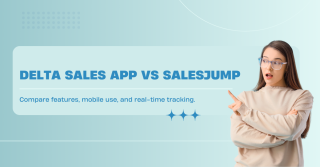Why is an All-in-One Field Software Solution a Smart Move?
_1745231080.png)
Cloud-based tools are rapidly changing how field teams operate. As retail execution becomes more complex, brands are moving away from siloed tools in favor of integrated, all-in-one platforms.
For a long time, point solutions — tools that handle one specific task — were seen as a flexible way to manage operations. But as tech stacks grow and field activities become more interconnected, the challenges of juggling multiple platforms are becoming increasingly clear. In this context, all-in-one software is quickly proving to be the more effective and scalable solution.
From small businesses to enterprise-level CPG brands, centralized software is helping teams simplify their workflows and achieve better results in the field. Here’s how this shift is creating value — not only for brands, but for their field reps, partners, and retail customers.
Accessibility
One of the biggest strengths of an all-in-one platform is usability. Instead of asking field reps to switch between several apps during their day, they can rely on a single, easy-to-navigate system.
A modern Field Sales Management App brings everything together — scheduling, order entry, photo capture, task management, and more — in one unified experience. This leads to fewer mistakes, faster onboarding for new hires, and more consistent performance across teams.
When the system is easy to use, employees are quicker to adopt it — and that leads to smoother workflows and improved collaboration between field reps and headquarters.
_1745232374.png)
Cost Reduction
At first glance, using separate tools for different tasks might seem budget-friendly. But managing multiple apps often leads to hidden costs — extra subscriptions, duplicated work, and increased training time.
All-in-one solutions help control these costs by reducing software sprawl. With one platform, you simplify vendor relationships, minimize license fees, and reduce IT overhead. Teams save time by staying in one system, and time saved directly contributes to reduced operational expenses.
Plus, brands gain the flexibility to scale their usage without needing to buy or integrate new tools every time their field needs grow.
Compatibility
In retail execution, most processes are connected. The tool your team uses to report on shelf visibility needs to work seamlessly with the one they use to place orders or monitor stock.
All-in-one platforms are designed to handle these interdependencies from the start. Instead of stitching together various apps and hoping they’ll sync correctly, users benefit from smooth integration across tasks.
Whether you're tracking field visits, capturing sales data, or analyzing performance, a centralized solution ensures all parts of the system work well together — reducing errors and saving time.
Security
Managing security across multiple tools can be complex and risky. Each app has its own login process, data storage method, and update schedule — which makes it harder to ensure consistent protection across your organization.
With a single platform, your team benefits from consistent, centralized security protocols. From permission management to data encryption, everything is handled within one system, making it easier to stay compliant and protected.
Fewer platforms also mean fewer chances for weak links or accidental data leaks.
_1745232014.png)
Scalability
If your business is growing, your software needs to keep up. Single-use tools often struggle to scale smoothly — requiring new integrations, more licenses, or even a full switch to a different system.
That’s why scalability is one of the top reasons brands choose all-in-one execution software. Whether you’re expanding to new markets, onboarding more reps, or launching new products, these systems can grow with you — no need to rebuild your workflows every time something changes.
When this platform include Distributor Management Software, it becomes even more powerful — offering both field visibility and distribution insights in one place.
Smarter Data Collection
Collecting accurate, useful data is essential to any field operation. But when teams use disconnected tools, valuable data often gets lost, delayed, or misaligned.
All-in-one platforms centralize data collection, making it easier to gather, organize, and analyze insights. Field reps don’t have to enter the same data twice, and managers don’t have to pull reports from three different systems to see what’s happening.
With data feeding into one unified dashboard, brands can make quicker, smarter decisions — whether it’s about product placement, sales trends, or route optimization.
All-in-One Software Solution vs. Single-Use: Which Works Best?
Final Thoughts
Field operations are evolving. Today’s sales and execution teams need tools that support them across every task — not just one part of the process. All-in-one software is designed to meet that need, providing consistency, efficiency, and visibility across the board.
For brands navigating complex retail landscapes, investing in a solution that includes a robust Field Sales Management App and scalable Distributor Management Software offers long-term benefits. It’s a move that empowers field reps, strengthens partnerships, and sets the stage for growth.
As technology continues to advance, it’s clear that the future of field execution lies in connected, all-in-one platforms — not fragmented systems that create more work than they solve.
Frequently Asked Questions (FAQs)
1. What is a Field Sales Management App?
A Field Sales Management App is a mobile or web-based application designed to help field sales teams manage their daily activities. It typically includes features like visit scheduling, task management, order collection, performance tracking, and real-time reporting — all within one interface. It streamlines field operations and reduces the need for multiple apps.
2. How does an all-in-one platform differ from using multiple point solutions?
An all-in-one platform combines various functions — such as reporting, order entry, employee tracking, and analytics — into a single system. This eliminates the need for switching between tools, improves data accuracy, and simplifies training and support. Point solutions may handle one task well but often require manual syncing and additional resources.
3. Why is Distributor Management Software important for field operations?
Distributor Management Software provides visibility into the distribution network by tracking inventory levels, secondary sales, and order fulfillment. When integrated with field operations, it allows your sales reps to make better decisions on the ground, prevent stock-outs, and ensure products are available where they’re needed most.
4. Is an all-in-one solution suitable for small or mid-sized businesses?
Yes, absolutely. These platforms are scalable, meaning they can be used by businesses of all sizes. Whether you have a handful of field reps or hundreds, a unified system simplifies workflows and makes it easier to scale as your operations grow.
5. How does an all-in-one system improve data collection?
Instead of collecting data across multiple disconnected apps, an all-in-one solution centralizes it in one place. This makes it easier to track performance, identify trends, and generate reports without the hassle of merging spreadsheets or dealing with inconsistent formats.
6. Does using a Field Sales Management App reduce training time?
Yes. Since all key functions are available in one interface, reps don’t have to learn multiple tools. This makes onboarding faster, minimizes confusion, and reduces errors during daily operations.
7. Can all-in-one platforms integrate with my existing systems?
Most modern all-in-one platforms are built with integration in mind. Whether you need to sync with an ERP, CRM, or third-party tools, integration options are typically available and easy to implement.









